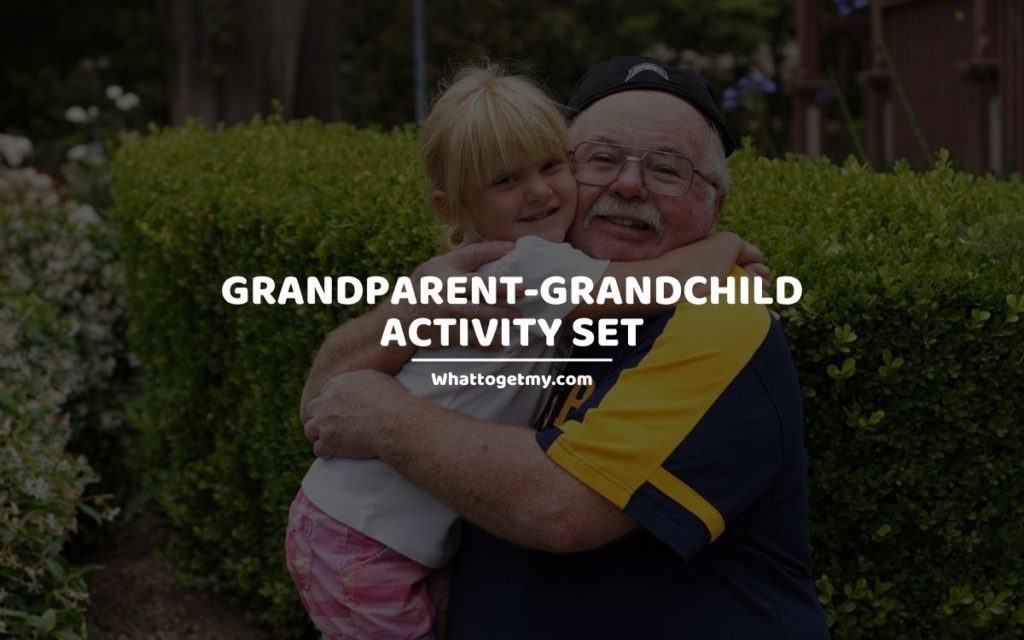Signs You Either Didn’t Get the Job or Will Get the Job After Interview
WhatToGetMy Instructional Article
- This article will tell you how to know if you didn’t get the job after an interview and how to know if you got the job after the interview.
- Not all bad interviews mean you won’t get the job. Read on for 5 important things to remember and do when it comes to looking for signs you either didn’t get the job or will get the job after an interview.
Watch the video version of this article:
Monthly job openings in the United States from September 2019 to September 2020 (in millions). Source: Statista
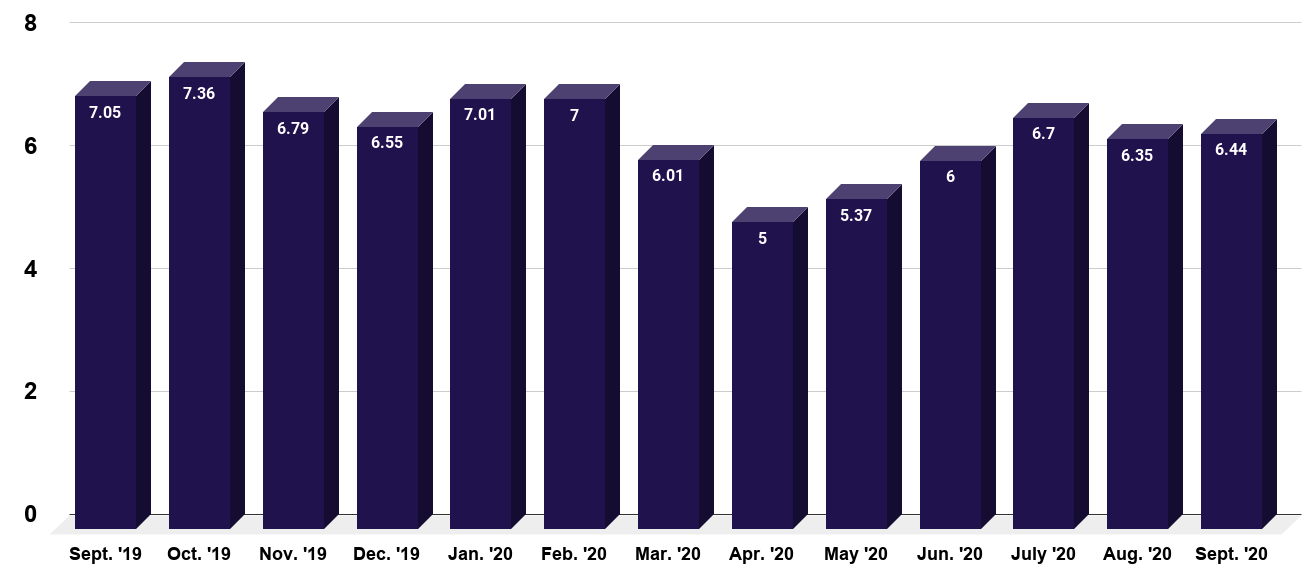
Monthly job hires and separations rate in the United States from September 2019 to September 2020. Source: Statista
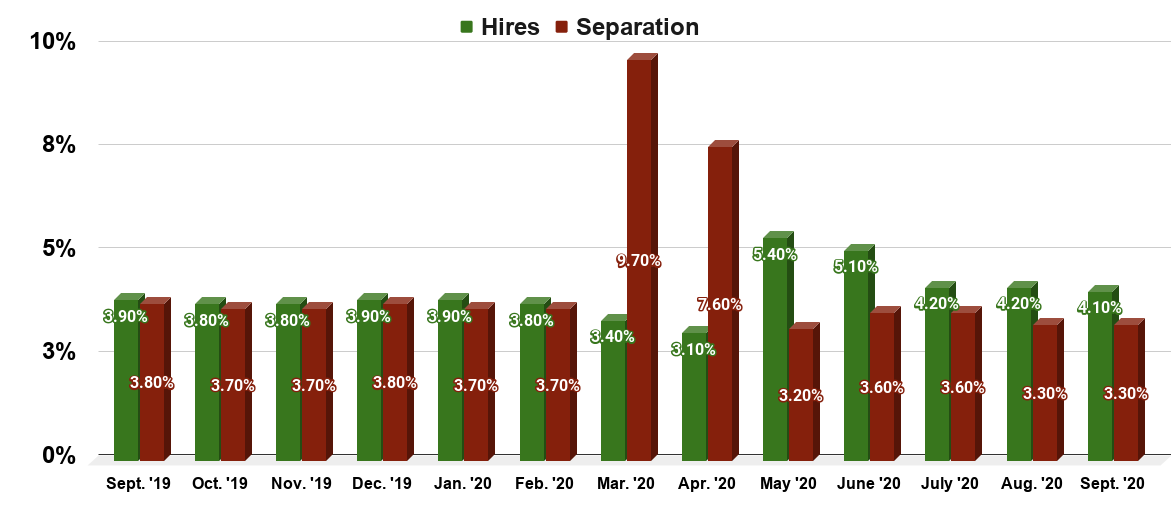
With as much as 6.44 million job openings in the single month of September 2020 (according to the first chart above) and a hiring rate of only 4.1% of that number in the same month (according to the second chart), it is no wonder every interviewee wants to know whether they will get the job after an interview, and what the good signs after a job interview are, that will tell that they will hire you.
This article will answer the question of what are some good signs you got the job after an interview and also signs you’re not getting the job. Read on to find out whether you will land that new job and join the league of the 4.1% (from the above stats), or whether you need to continue your job search.
33 Signs you either didn’t get the job after interview or will get the job after interview.
There are different aspects to an interview, and in each of those aspects, there are tell-tale signs your interview didn’t go well and you didn’t get the job, as well as signs that you had a good interview and they will hire you. These are the 33 signs are you either didn’t get the job after an interview or will get the job after an interview.
The general demeanor of the interviewer and/or interviewing panel during the interview.
When it comes to this aspect of the interview process, look out for these signs.
Signs your interview didn’t go well and you’re not getting the job.
1. The interviewer was distracted throughout the interview and didn’t give you their full attention.
Did you notice that the interviewer or members of the panel seemed distracted throughout the interview? Maybe when the interview started they appeared engaged, but a few minutes into it, some of them start fiddling with their phones or looking disinterested. This is never a good sign. It means they have lost interest and would not be following up with you after the interview.
It is important to point out that an employer knows within a few minutes of the interview whether you are the candidate they are looking for or not. Once they lose interest, they tune off and become distracted and disinterested in what you have to say.
2. The interviewer suddenly becomes a little hostile and curt during the interview.
This may happen after you answered a question or two that the interviewer or panel thought was completely off or unsatisfactory. While this is rude, you have to understand that selecting candidates and going through interviews is a time-consuming and costly exercise for companies. Since time is money, once they get the sense that you are not their candidate they generally become unwelcoming and can’t wait to wrap up the interview and move on to the next candidate.
Signs you had a good interview and they will hire you.
3. The interviewer was engaged throughout the interview and actively listened to you.
Where the interview is going well however and you are likely to bag the deal, the interviewer gives you their full attention. Since you are their candidate, they want to hear all that you have to say. You will notice that you have their rapt attention and they are writing as you speak and making notes.
4. The interviewer became more relaxed during the interview and made you feel more comfortable.
Like we said earlier, an employer knows within minutes whether you are their candidate or not. And once they come to that realization, you will notice a shift in the general atmosphere of the environment. It becomes more relaxed and comfortable, and you would almost feel like you’ve known them before that interview. The whole point is to get you comfortable because they are interested in you and are hopeful that they can give you the job.
The nature of the questions asked.
This aspect of the interview can also tell you whether or not you will get the job after the interview through the following signs.
Signs you will not get the job offer.
5. They ask questions that have nothing to do with the job you applied for.
They may ask you questions that appear very unrelated to the job you applied for. Some interviewers may start asking probing questions about trade secrets, especially if where you worked before was a direct competitor.
Where this happens, you can politely tell them that with respect it has nothing to do with the interview and that you would have to decline to answer their question. With such questions, it is clear they have no real intention(s) of hiring you and are only using the interview as a smokescreen to try and get information on their competitor. This also shows that the company may not be the kind of place you want to work if they resort to such underhand corporate tactics.
6. They ask questions that are too easy.
If you find that you are being asked questions that are too easy, that is not something to be happy about. A company that wants to hire you will ask difficult challenging questions to see that you are up to the task and would be able to tackle the role you are being interviewed for. Asking you questions that are too easy is sometimes a polite way to get through the interview and make you not feel bad about it afterward. But make no mistake, they may not follow it up with a job offer.
7. There are no engaging questions on your experiences and the skills you may have which would be useful for the job.
This also shows that they did not read your resume or bother too much with it. An employer who wants to hire you wants to know how your skills and experiences will help them, and they will not ask about this in an interview. Companies that interview with no intention of hiring you are notorious for doing this. Given that they have no real intentions of hiring after the interview, they won’t waste any time trying to understand how your skills will help them.
8. They do not ask if you are looking elsewhere for work.
When an employer is interested in hiring you after an interview, they want to be sure that you are not looking elsewhere. And so, they usually ask questions of what other places you have applied to and if you are available and the likes. If no questions about this came up during the interview, it is almost certain they won’t be offering you the job.
Signs you will get the job after interview.
9. They ask you personal questions that have a bearing on your ability to work and pointed questions about your experience and skills.
You may find they ask personal questions such as where you live and if you can commute to work and the likes. They may even go as far as asking if your spouse or partner would have a problem with you working long hours. Others may ask what your long term plans and goals are professionally. These types of personal questions are great because it shows that they are interested in you and want to see that you will be a great fit in their company.
An employer who is interested in offering you a job after the interview will also ask pointed questions about the experiences and skills listed in your CV. This is not only a great sign that they read your CV, it also shows that they are seriously considering you for the position.
10. They ask you if you have other interviews and job offers.
This is another big sign that they are interested in you. This question is their way of trying to assess where they stand in terms of losing you to other competitors.
11. They ask you when you can start.
When they start to ask you when you can start, you are almost guaranteed the job, and they want to know whether you will be available to take on the job once it’s offered to you.
The content of what they said during the interview.
This aspect of the interview can spell the start of the job after the interview, or its end even before it begins if you see any of these signs during the interview.
Signs you’re not getting the job.
12. They say nothing about the company and what it is all about.
If in all their questions and interaction with you, no mention is made about the company, its values, and what they stand for, that is a red flag that they don’t see you as part of the company. And since they don’t, they don’t see the need to bother telling you about what they stand for.
13. They point out that they are still interviewing other candidates.
This is a subtle way of saying you are not the candidate they are looking for. And if you ask when you can expect to hear back from them, they may say something along the lines of the fact that they are still interviewing other candidates and will get back to you. That is a nice way of telling you that you won’t be hearing back from them.
14. They say you are overqualified.
When a company tells you that you are overqualified in an interview, they have simply told you in not so many words that they can’t hire you because with your skillset you would be expensive for them. It is nothing to lose heart over, but just know that they won’t be offering you the job.
15. They keep repeating a particular question.
If you find that they keep repeating a particular question during the interview, that question is an indication of what they are not comfortable with concerning working with you. How you answer that question will very well determine whether they hire you or not.
Signs they will hire you.
16. They talk about the company and its vision and general corporate culture.
This is their way of trying to sell their company to you to attract you to stay. And companies only do this if they see you as someone they want to give the job to after the interview.
17. They speak positively about your skills and aspects of it they like.
An employer who wants to hire you after the interview will tell you the key aspects of your CV that appealed to him/her and how he/she hopes you can bring that experience to bear in your work with them. And you know they are impressed when they ask you to elaborate on those skills and what you did in connection with them.
18. They tell you specifically when they want to have filled the vacancy.
Where an employer sees you as a good fit and wants to hire you, they will indicate when they want the vacancy to be filled. This is their subtle way of letting you know when you would have heard from them. And no, they don’t divulge this information to everyone except those they are seriously considering for the position.
19. They talk about salary and employment benefits.
This one is another big tell-tale sign that you will be hired after the interview. An employer will not bother talking benefits and remuneration with you if they have no interest in hiring you. Once an employer is impressed with you and wants to give you the job, they will start asking you about how much you think would be a good salary.
In some cases, they may ask you if you feel the amount you are asking for is reasonable. When you get a question like that, you need to think carefully before you answer. If you are flexible it is important to point this out because their asking could be a subtle hint that you are too expensive for them, even if you were very good during the interview.
The length of the interview.
When it comes to the length of the interview, look out for any of these 2 signs.
Signs your interview didn’t go well.
20. The interview is shorter than arranged for.
Usually, interviews should last at the very minimum, for at least 25 – 30 minutes. If they suddenly want to rush through the interview and call it a wrap so soon after it’s started that’s never a good sign. It’s a sign your interview didn’t go well and no job offer will be forthcoming.
Signs you had a good interview.
21. The interview goes on for longer than planned.
This is always a good thing. It shows the employer is having a great time and enjoying having you around. Since time is always money, an employer will not extend an interview just to have a chat with an interviewee they have no intentions of hiring or at least thinking of hiring.
Their conduct after the interview.
Even when the interview has come to an end, there are still some signs to look out for, know whether or not you will get the job after the interview.
Interview signs you didn’t get the job.
22. They lead you out the door.
Usually, if the employer sees you as someone they want to work with them, they will use the end of the interview to show you around and give you a mini excursion of your would-be workplace. If however, they escort you out the door after the interview, that is almost always an indication that you’re not coming back.
23. When you follow up, they make excuses or never respond.
Where this happens to you the first time you make a follow-up, don’t bother with subsequent follow-ups so that you don’t appear needy and desperate. Let it go and look for other opportunities.
24. They advertise the job after the interview or leave the post on the website where you found it.
This is another terrible thing some companies resort to doing rather than telling you that you didn’t pass the interview. If you find the vacancy still left in the same place after your interview, or re-advertised somewhere else, it is the clearest sign that you did not make the cut after the interview.
Hints that you got the job.
25. They show you around the premises and introduce you to key personnel.
Like we said earlier, an employer who sees you as part of their company during the interview will take the opportunity to give you a mini excursion after the interview. It is another way of trying to entice and get you excited about working with them. Once you get this treatment at the end of the interview, you can be almost certain that a contract of employment is coming after the interview.
26. They tell you they will get in touch by a certain time.
If they don’t want to hire you, they won’t be definite about time so that you do not have false hopes. Usually, when they have no intention of hiring you, they will be very vague with getting back to you. But being clear and definitive about it means they are looking to give you the job and want you to wait for them and not go to another employer.
27. They give you their business card.
This is another big sign that they like you and are seriously considering you after the interview. They won’t give a business card to someone who they have no interest in who could bother them afterward.
28. The job posting is removed immediately after your interview.
This one is almost always the final indicator that they have found the person they are looking for, and that person is you. Unless of course another equally great candidate was interviewed after you, you can take this as a hint that you got the job or will get the job.
Your answers and general conduct during the interview.
On your part, you can jinx your chances at getting the job after the interview if you commit a major faux-pas on any of these 5 aspects.
29. You show up not appropriately dressed or overdressed.
You might wonder if it is possible to be overdressed for an interview, and the answer is yes. And here’s how. If you are interviewing at a small company, going all out to wear an expensive tweed suit and appearing in expensive formal clothes may intimidate rather than impress the company. And they may from your expensive attire decide that they would not be able to afford you. Whereas if you dressed that way for a big firm, you would immediately impress them and create a good first impression.
When it comes to dressing for an interview, it is best to pick formal outfits that are toned down to the corporate size of the company. Reserve the expensive outfits for medium to big companies, and for small companies be rather formal, presentable, and yet approachable.
30. You arrive late for the interview.
This would lose you the job even before you opened your mouth. In some cases, your late arrival will make the panel hostile towards you, and who can blame them. An interviewee who is late for an interview creates the impression that they will have no regard for time when they get hired, and will work at their convenience. No employer wants to hire such an employee.
31. You did not answer an important question satisfactorily.
Maybe you were doing so well with the questions until they asked one important question that you were unable to answer. Sadly, your failure to answer an important question will show unpreparedness on your part and would cost you the job.
32. Your general comportment during the interview.
Doing any of the following during an interview is likely to cost you the job after the interview:
Not sitting upright and slouching.
This tells the interviewer that you might be a lazy employee who will not work with any energy or zeal.
Stuttering or being unable to speak confidently or having your voice inaudible or reduced to a mere whisper.
It shows you are unsure of yourself and have no idea what you’re talking about. And since you are unsure of yourself, they won’t bother with hiring you.
Failure to keep good eye contact while answering questions.
This also conveys the impression that you are not confident and assertive. Employers want confident and assertive employees.
Crossing your legs during the interview.
This is one sitting posture that is a no-no at an interview if you want to get the job or be taken seriously. It comes off as arrogant and overly sure of yourself and is likely to cost you the job. The best sitting position is sitting with your legs together with feet on the ground and shoulders upright. If you must cross your legs, cross your feet under your seat and your shoulders in an upright position.
Fiddling with your hands and generally appearing restless.
Fiddling with your hands shows an obvious nervousness on your part which will not impress the employer because it means that you are unable to cope under pressure or at least have a semblance of being able to keep it together. It can also be very distracting during an interview. To avoid that happening, it is best to keep your hands on your lap once you take the proper sitting position. In that way, you can keep a tab on how much you gesticulate or fiddle with it.
33. Failing to ask any question(s) at the end of the interview.
As much as the interview is all about asking you questions to see if you will be given the job, the employer also wants to see that you have taken the time to read about them. And the point of this is to see that you have a real interest in their company and are not just coming to get a job you have no interest in.
This is what your asking questions at the end of the interview communicate to them. It tells them that you have done your homework and see their company as a place you want to work at.
5 Things you need to bear in mind about these signs and need to do.
Some things need to be said about these signs. Before you get all worked up about the signs we have highlighted earlier, always remember the following important points.
1. A bad interview does not always mean you won’t get the job and vice versa.
It is not always the case that if you had a bad interview you won’t get the job, or that if you had a great interview, you will get the job. There have been exceptional instances of people that had a bad interview but still got the job and yet others who did exceptionally well in their interview and still did not get the job.
Other factors still have an impact on the final decision taken after an interview. An employer may feel that the one who performed exceptionally well would be too expensive and the one who fared badly may be less expensive and still deliver with the right onboarding training.
This does not however mean or should it be taken as translating into going into an interview completely unprepared and making a mess of the interview. If you do so, you can be guaranteed that the employer will not take you seriously enough to offer you a job.
Whatever the case, it is always important to remember that these signs, great as they are in trying to get you to know where you stand after an interview, should never be the only things that determine your next steps after an interview.
2. Some companies conduct interviews with no intentions to hire.
This is another very important point to be aware of. Some companies already have a candidate in mind for the job but have to hold interviews to go through the motions and fulfill all righteousness. Where this happens to be the case, it would not matter how good or bad the interview went because nothing concrete would come out of it.
3. Not landing a job after an interview does not mean you are incompetent.
You must never forget this. Don’t let your performance at an interview put a downer on your confidence. Always remember that interviews and interviewers are very subjective. There are no objective standards, and everything depends on how another person feels. And if they felt you were not a good fit for them, that is their own subjective opinion that should not affect the way you see yourself. An employer who sees you as a good fit will come along and give you a job.
The only thing to do after each interview is to make a mental note of the things or questions you could have answered better or done better with and take them as lessons for the next job interview you get called to.
4. Never stop applying for jobs after you get called for an interview because until you have an actual offer and signed contract, nothing is certain.
This is always something you must never forget. Ultimately, until you get a firm contract and sign on the dotted lines, you still need to keep looking and applying for a job (or jobs). From the first three points mentioned, you can see that there are several other factors at play after an interview. And these other factors are almost always independent of how good or bad a candidate performs at an interview.
Share of prospective employees in the United States who continue looking for other jobs even when an offer has been extended and they are going through the background check process in 2018, by age. Source: Statista
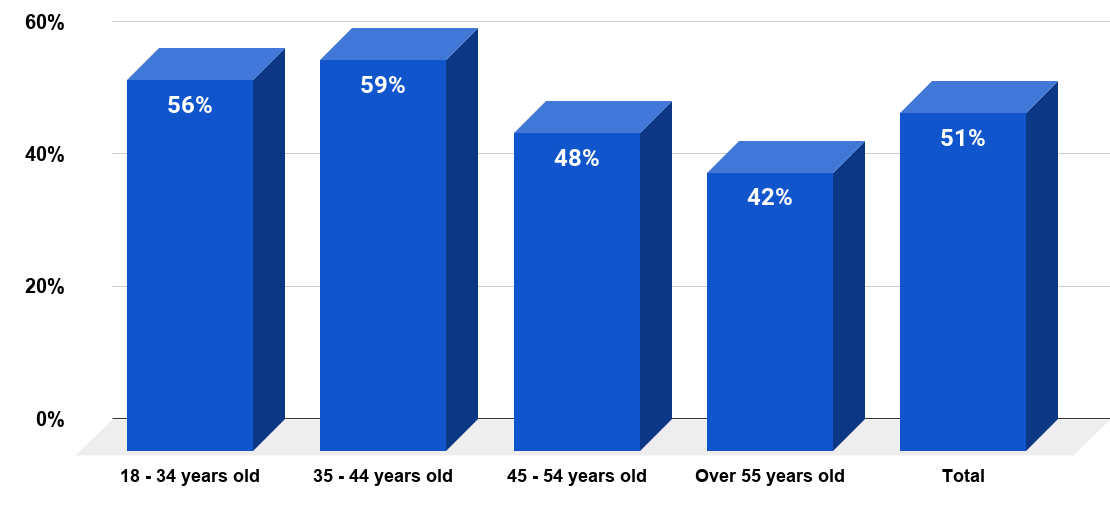
As much as 51% of Americans in 2018 according to the above chart still kept looking for other jobs even when they had an offer made to them. How much more when you don’t have an actual offer. It would be short-sighted to stop applying for other jobs simply because an interview went very well, and yet no firm offer has been extended to you.
5. Don’t wait for too long after an interview before you start applying again.
How long prospective employees in the U.S. are willing to wait for a response 2018. Source: Statista
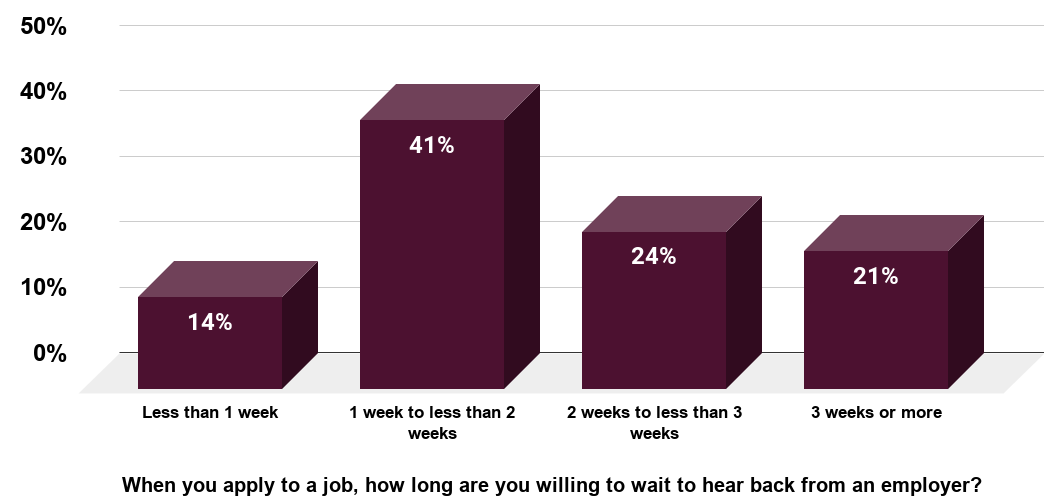
Don’t wait for more than 2 weeks after an interview before you put yourself out there again. When an employer is looking to fill a vacancy, it won’t take a long time to do so. They will usually act within a week or two after conducting their interviews.
And if they still haven’t gotten back to you in that period, there is no need to waste your time waiting and hoping that they would get back to you. Put yourself out there and start applying for other jobs.
Remember, as shown in the first chart in this article, there are millions of job openings every month in America. Look out for one or several of those million opportunities and apply. And it won’t be long before one of those opportunities turns into an open door.
You may like these related articles on How to remain positive in difficult times and How to start caring about yourself.
Frequently Asked Questions.
Does a bad interview mean no job?
No, it is not always the case. Like we said earlier, there have been exceptional cases where the interview went bad but the person still got the job. There are still other factors that come into play after an interview.
While a bad interview will generally mean no job, there will be exceptional times when the opposite will be the case and you still get the job.
This does not however mean you should go unprepared for an interview and make a total mess of it.
What are the signs phone interview didn’t go well?
When it comes to phone interviews, it can be a little difficult knowing whether the interview was bad or good because you can’t see the interviewer’s face or general disposition or demeanor, to judge for yourself. With the little that you can read between the lines over a telephone, these are some bad phone interview signs to look out for.
- They don’t ask you any personal questions that have a bearing on the position.
- They don’t ask you relevant and pointed questions on your experience and skills.
- They don’t ask you when you are available to start or give any indications of when you would hear back from them.
- They don’t ask you if you have other offers lined up or other interviews.
- They don’t tell you about the company and its corporate culture even in very general terms.
- They are in a hurry to end the interview.
The interviewer said they would call but didn’t, what does this mean and what should I do?
It usually means that they are no longer interested in giving you the job, for whatever reasons. Sometimes though, it could just be a delay on their part because something came up at the time they said they’ll get in touch. Whatever the case, you don’t need to hold your breath and stop looking for other opportunities.
What you can do is send one follow-up email thanking them for the interview and saying that you are following up on the promised response. If they respond, well and great. If they don’t, still well and good. Carry on applying to other places in the meantime. After the first follow-up, don’t continue with asking them or you would create a bad impression of yourself.
What are some things interviewers say when you got the job?
They may say things like
- “It would be really great to have you here with us”.
- Or they could ask, “assuming we are to offer you the job now, when do you think you can start?”
- You may also be asked, “how much do you want to be paid or think you’re worth”?
Is it a good sign when the interviewer responds to a thank you email?
It is neither a good sign nor a bad sign. Some interviewers are very polite and like to respond to a thank you email. It does not mean they would give you or not give you the job until they have given you a contract to sign.
However, where they don’t respond at all, that is a sign they have no interest in offering you a job.
How to know if you did well in an interview?
The idea of doing well in an interview is a subjective one. If you feel that you answered all the questions you were asked to the best of your abilities, and you did well when everything is considered, then pat yourself on the back. You have done well. The interviewer not following up or not giving you the job could be for other reasons that have no bearing on how well you did in the interview.
When all is said and done, always remember!
Job interviews are very subjective. An interview going well or not going well, is not always the final determiner of whether you will get the job. Always give every interview you get your best shot.
Landing the interview on its own is applaudable because there would be several other applicants who did not make it to the interview stage. Do your part, go prepared, and do your best.
If a job offer does not come out of it, do not lose heart. Stay positive and continue to apply and in time you will land that dream job.
01 HOUR 22 MINUTES
ESTIMATED TIME DESIGNING AND UPLOADING THIS ARTICLE
10 HOURS 52 MINUTES
ESTIMATED TIME RESEARCHING AND WRITING THIS ARTICLE
You Might Also Like
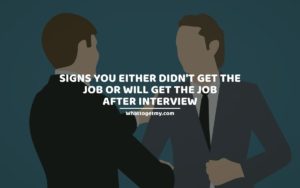
33 Signs You Either Didn’t Get the Job or Will Get the Job After Interview
Signs You Either Didn’t Get the Job or Will Get the Job After Interview WhatToGetMy Instructional Article This article will tell you how to know if you didn’t get the job after an interview and how to know if you got the job after the
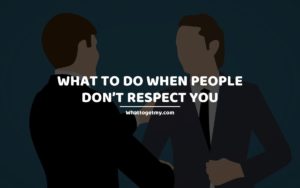
What to Do When People Don’t Respect You
What to Do When People Don’t Respect You WhatToGetMy Instructional Article Wanting to be respected is a normal and natural human feeling and there is nothing wrong with you wanting to be respected. When people disrespect you, it is either because they are the problem

27 Unique Gifts For Realtor From Client
Looking for what to get a realtor as a thank you gift? Look no more. In this article, you will find the best and unique gift ideas for realtors (also called real estate agents), as well as thank you gift ideas for realtors at closing.


